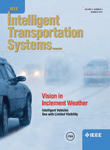
IEEE Intelligent Transportation Systems Magazine
Scope & Guideline
Advancing Technologies for Efficient Transportation
Introduction
Aims and Scopes
- Intelligent Transportation Systems (ITS) Development:
The journal emphasizes the development and implementation of ITS, incorporating advanced technologies such as AI, machine learning, and data analytics to improve transportation efficiency and safety. - Autonomous and Connected Vehicles:
Research on autonomous and connected vehicles is a significant focus area, exploring their design, functionality, and integration into existing traffic systems. - Traffic Management and Control Strategies:
The journal publishes studies on innovative traffic management and control strategies, including the use of real-time data and predictive analytics for congestion management. - Human Factors and Safety in Transportation:
Understanding human behavior in transportation systems is crucial, and the journal addresses safety issues, driver behavior, and the interaction between humans and automated systems. - Sustainability and Environmental Impact:
The journal also explores the sustainability aspects of transportation systems, including the impact of new technologies on energy consumption and emissions. - Cybersecurity in Transportation Systems:
With the rise of connected vehicles and ITS, the journal examines cybersecurity risks and countermeasures to protect transportation networks.
Trending and Emerging
- Artificial Intelligence and Machine Learning Applications:
There is a notable increase in the application of AI and machine learning techniques in various aspects of transportation, from traffic prediction to autonomous vehicle decision-making. - Data-Driven Decision Making:
The trend towards leveraging big data analytics for real-time decision-making in traffic management and transportation systems is on the rise, with numerous studies exploring data integration and analytics. - Cybersecurity and Resilience in Transportation Systems:
As transportation systems become more connected, the focus on cybersecurity and resilience against cyber threats is gaining momentum, highlighting the need for robust security frameworks. - User-Centric and Human Factors Research:
An emerging focus on user-centric design and human factors in transportation systems is evident, addressing safety and usability in automated and connected environments. - Sustainable Transportation Innovations:
Research exploring sustainable practices and technologies, such as electric vehicles and smart public transport systems, is increasingly prevalent, aligning with global sustainability goals.
Declining or Waning
- Traditional Traffic Engineering Methods:
As the focus shifts towards innovative technologies and data-driven approaches, traditional traffic engineering methods are becoming less prominent in recent publications. - Manual Traffic Control Systems:
With the rise of automation and intelligent systems, research related to manual traffic control systems is diminishing as more emphasis is placed on automated solutions. - Basic Vehicle Infrastructure Communication:
The basic vehicle-to-infrastructure communication studies are declining as more complex and integrated communication systems, including V2X technologies, gain traction. - General Public Transportation Studies:
Specific studies focusing solely on public transportation without the integration of smart technologies or data analytics are less frequently published, indicating a shift towards more technologically integrated approaches. - Static Traffic Models:
The relevance of static traffic modeling is decreasing in favor of dynamic and adaptive models that better reflect real-time traffic conditions and behaviors.
Similar Journals
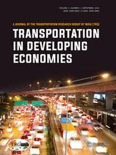
Transportation in Developing Economies
Catalyzing equitable mobility in the global south.Transportation in Developing Economies is a premier academic journal published by SPRINGER INT PUBL AG, specializing in the interdisciplinary study of transportation systems in developing nations. With an ISSN of 2199-9287 and an E-ISSN of 2199-9295, this journal provides an essential platform for researchers, policymakers, and practitioners to explore the unique challenges and innovations in transportation infrastructure, mobility, and planning within emerging economies. The journal aims to critically assess and promote sustainable transport solutions that cater to the socio-economic dynamics of these regions, making it an invaluable resource for those invested in equitable transportation development. With its open access philosophy, it ensures widespread dissemination of research findings, fostering collaboration and knowledge exchange among scholars and industry professionals alike. As the global focus on sustainable practices intensifies, Transportation in Developing Economies stands at the forefront of vital research, contributing to both academic discourse and pragmatic advancements in the field.
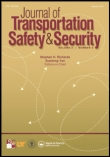
Journal of Transportation Safety & Security
Championing collaboration for a safer transportation future.The Journal of Transportation Safety & Security (ISSN: 1943-9962; E-ISSN: 1943-9970), published by Taylor & Francis Inc, stands as a pivotal resource for professionals and researchers in the fields of safety research and transportation. Since its inception in 2009, this journal has delivered rigorous peer-reviewed articles that explore critical issues relating to safety and security within the transportation sector. With an impressive impact factor reflecting its scholarly significance—ranking Q1 in Safety Research and Q2 in Transportation as of 2023—this journal occupies a unique position in the academic landscape, encouraging innovation and collaboration among researchers dedicated to improving safety measures. The Scopus rankings further affirm its status, placing it 17th out of 109 in Safety Research and 49th out of 141 in Transportation. Readers can expect contemporary discussions and comprehensive reviews tailored to both practitioners and academics alike, effectively bridging the gap between theory and application. Explore the Journal of Transportation Safety & Security to contribute to a safer and more secure transportation environment.

Vehicles is a pioneering open access journal published by MDPI since 2019, dedicated to advancing knowledge in the fields of Automotive Engineering and Electrical and Electronic Engineering. Based in Switzerland, the journal provides a valuable platform for researchers, professionals, and students to disseminate high-quality, peer-reviewed research across essential areas of vehicle technology and innovation. With an impressive Q2 ranking in both Automotive Engineering and Electrical and Electronic Engineering as of 2023, and a notable placement in the Scopus rankings (Rank #37/125 and #320/797, respectively), Vehicles plays a critical role in fostering collaboration and knowledge exchange within these fast-evolving disciplines. Through its commitment to Open Access, Vehicles ensures that cutting-edge research is accessible to a global audience, thereby contributing significantly to the collective understanding and development of sustainable transportation solutions. Situated at the crossroads of engineering innovation and practical application, Vehicles invites contributions that explore contemporary challenges and promote transformative advancements in the automotive sector.
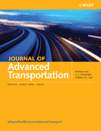
JOURNAL OF ADVANCED TRANSPORTATION
Exploring Solutions for Tomorrow's Mobility ChallengesJOURNAL OF ADVANCED TRANSPORTATION, published by WILEY-HINDAWI, stands as a pivotal platform in the fields of automotive engineering, computer science applications, economics, mechanical engineering, and strategy and management. With an impressive impact factor and positioned in the Q2 quartile across multiple categories as of 2023, this open-access journal offers researchers, professionals, and students unparalleled opportunities to disseminate and access cutting-edge research. Operating under an open access model since 2017, the journal fosters global collaboration and knowledge exchange, encouraging innovative solutions to contemporary transportation challenges. Its comprehensive scope, spanning converged years from 1979 to 2024, reflects its commitment to addressing the evolving landscape of transport systems worldwide. Researchers from diverse disciplines are invited to contribute transformative studies that advance the field and inspire future endeavors.
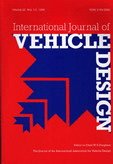
INTERNATIONAL JOURNAL OF VEHICLE DESIGN
Exploring the Future of Automotive EngineeringThe INTERNATIONAL JOURNAL OF VEHICLE DESIGN is a distinguished publication that has been at the forefront of automotive engineering and mechanical design since its inception in 1979. Published by INDERSCIENCE ENTERPRISES LTD in the United Kingdom, this journal aims to foster innovative research and technical knowledge in the field of vehicle design, encompassing various aspects from conceptualization to manufacturing and performance analysis. With an ISSN of 0143-3369 and an E-ISSN of 1741-5314, the journal extends its accessibility to a global audience, although it currently does not operate under an open access model. Recognized for its scholarly contributions, it holds a Q3 ranking in Automotive Engineering and a Q4 ranking in Mechanical Engineering as of 2023, reflecting its position among peers with an increasing impact in the discipline. Researchers, professionals, and students will find valuable insights and cutting-edge research in the articles published, contributing to a deeper understanding of advancing vehicle technologies and methodologies. For inquiries, the journal is based at the World Trade Center Building, 29 Route de Pré-Bois, Case Postale 856, CH-1215 Geneva, Switzerland, where one can also follow its developments and contribution to the growing body of knowledge in vehicle design.
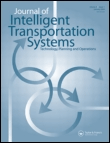
Journal of Intelligent Transportation Systems
Transforming Transportation Through Cutting-Edge ResearchThe Journal of Intelligent Transportation Systems is a premier peer-reviewed journal published by Taylor & Francis Inc, focusing on cutting-edge research in the fields of transportation systems and intelligent technologies. With an ISSN of 1547-2450 and an E-ISSN of 1547-2442, this journal stands out with its impressive impact, consistently ranking in the Q1 Quartile across multiple categories such as Aerospace Engineering, Applied Mathematics, and Automotive Engineering, among others. As of 2023, it holds distinguished Scopus rankings, including a remarkable #11 position in Aerospace Engineering, showcasing its significance in shaping contemporary research in intelligent transportation. Targeted at researchers, professionals, and students alike, the journal provides a forum for the dissemination of innovative ideas and technologies that enhance transportation systems’ efficiency, safety, and sustainability. The Journal of Intelligent Transportation Systems has been operating since 2004 and continues to play a vital role in advancing knowledge within its respective areas of study within the United Kingdom and globally.

EURO Journal on Transportation and Logistics
Pioneering insights in the realm of mobility and supply chains.The EURO Journal on Transportation and Logistics, published by ELSEVIER, is a premier open access journal dedicated to advancing the fields of transportation and logistics. Since its establishment in 2013, the journal has become a vital platform for disseminating cutting-edge research and insights, reflecting its significant impact in the academic community, as evidenced by its Q1 ranking in both Management Science and Operations Research and Modeling and Simulation as of 2023. Hailing from the Netherlands, this journal caters to a diverse array of scholarly disciplines, as highlighted by its ranking within the top quartiles across various Scopus categories including Mathematics, Decision Sciences, and Social Sciences. With a commitment to transparency and accessibility through its open access policy since 2020, the journal strives to engage not only researchers but also professionals and students, fostering a collaborative environment for the exploration of innovative solutions within the transportation and logistics sectors.
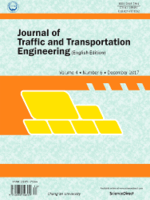
Journal of Traffic and Transportation Engineering-English Edition
Pioneering Research for the Future of Transportation.Journal of Traffic and Transportation Engineering-English Edition, published by KEAI PUBLISHING LTD, is a leading open-access journal that has been disseminating valuable research in the realms of civil and structural engineering, as well as transportation studies since 2014. With a robust impact factor reflected by its prestigious Q1 rankings in both Civil and Structural Engineering and Transportation, this journal stands at the forefront of innovation and scholarship, featuring contributions from experts across the globe. The journal is particularly noted for its practical and theoretical advancements in traffic and transportation engineering, making it indispensable for researchers, industry professionals, and students aiming to deepen their understanding of these critical fields. Dedicated to providing a platform for high-quality interdisciplinary research, the Journal of Traffic and Transportation Engineering embraces the principles of open access, ensuring that all published articles are freely available to foster knowledge sharing and collaboration within the community. With its headquarters located in Beijing, China, the journal continues to push boundaries and set new standards in the field of traffic and transportation research.
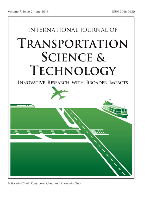
International Journal of Transportation Science and Technology
Empowering research to transform global transportation systems.The International Journal of Transportation Science and Technology, published by KEAI PUBLISHING LTD, stands as a pivotal resource in the fields of transportation, automotive engineering, civil and structural engineering, and policy management. With a robust Open Access model since its inception in 2012, this journal provides unparalleled visibility to research that impacts real-world transportation systems and infrastructure. The journal proudly holds a Q1 category ranking in crucial engineering fields, reflecting its high impact and quality of published research. Its diverse scope and comprehensive coverage make it an essential platform for researchers, professionals, and students alike who are eager to contribute to the advancement of transportation science and technology. With impressive Scopus rankings underscoring its relevance in environmental science and social sciences related to transport, the International Journal of Transportation Science and Technology continues to foster innovation and influence policy development globally, addressing the challenges of modern transportation systems.

Journal of Transportation Engineering Part A-Systems
Enhancing Understanding of Complex Transportation DynamicsThe Journal of Transportation Engineering Part A-Systems, published by the American Society of Civil Engineers (ASCE), is a cutting-edge, peer-reviewed journal dedicated to the advancement of knowledge in the field of transportation systems. With an ISSN of 2473-2907 and an E-ISSN of 2473-2893, this journal serves as a crucial resource for researchers, professionals, and students interested in the intricate interplay between civil engineering and transportation networks. Boasting a Q2 ranking in both the Civil and Structural Engineering and Transportation categories, this journal reflects the high-quality research contributing to these vital disciplines. Accessible through open-access options, the journal provides a platform for innovative ideas and research findings from 2017 to 2024, aiming to address contemporary challenges in transportation systems while fostering interdisciplinary collaboration. As an essential outlet for scholarly work in the United States and beyond, the Journal of Transportation Engineering Part A-Systems is committed to enhancing the understanding of complex transportation dynamics and the development of sustainable and efficient infrastructures.